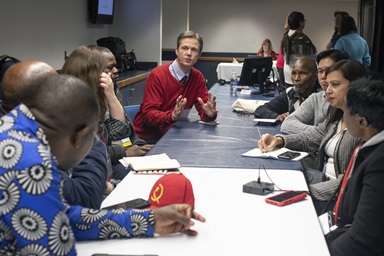Kelly Renee Gissendaner sang “Amazing Grace” as a lethal injection was administered by the state of Georgia. The 47-year-old was executed at 12:21 a.m., Sept. 29, for her role in the murder of her husband.
Gissendaner, who became a Christian and a theologian while in prison, was surrounded by people of faith – including many United Methodists – who were outside the prison walls praying for her.
“Last night, while a tragic and heartbreaking experience, also showed me the power of the church,” said Brenna Lakeson, a student at Emory University’s Candler School of Theology. A prayer service was held Sept. 30 at the Wesley Teaching Chapel at the United Methodist-related university.
Lakeson said most of the people who waited hours outside the Georgia Diagnostic Prison in Jackson were faith leaders or clergy. Gissendaner’s execution was originally scheduled for 7 p.m., but was delayed as federal and state courts reviewed her pleas for clemency.
‘A holy-ground experience’
The Rev. Virginia Uhl Tinsley, a United Methodist deacon in the North Georgia Conference, met Gissendaner many years ago as part of a Kairos Prison Ministry group at the state prison where the Georgia woman was first incarcerated.
The relationship grew, and Tinsley was one of the people Gissendaner asked to visit her on Monday, the day before her planned execution.
“It was a special privilege; I am so honored that she asked to see me. It was a holy-ground experience.”
Tinsley was also grateful she was able to meet and talk with Gissendaner’s children.
“It wasn’t until late Monday that we learned she was being granted a hearing,” Tinsley said. “The children planned to spend the day with her on Tuesday, but gave up that chance to go testify on her behalf. She was very proud of them, but as a mother it just breaks my heart that they couldn’t be with her.”
An Episcopal Church gathering in the area adjourned for the evening so all the priests could go to the prison to pray for Gissendaner.
“The importance of liturgy and the words of our ancestors struck me as so important. In our moments with no words, hymns and the Book of Common Prayer carried us through. I have never felt so supported by such a wide community of faith,” said Lakeson, who is a pastoral intern at Glenn Memorial United Methodist Church.
The Candler School of Theology community knew and treated Gissendaner as one of their own after the inmate graduated from the Certificate for Theological Studies program at Lee Arrendale State Prison in 2011. The program is sponsored in part by Candler, one of the 13 United Methodist seminaries, and was founded by Candler's Associate Professor of Christian Ethics Elizabeth M. Bounds and alumna Susan Bishop.
Students and faculty of Candler said Gissendaner had truly turned her life around. Inmates who were placed on suicide watch were often put near her because she was able to speak to them about faith and the sacredness of life.
She was truly transformed by Christ, Tinsley said.
Admitting guilt
Gissendaner was convicted of orchestrating the murder of her husband, Douglas in 1998. Her guilt was not in question. Her husband’s family agreed with and supported her execution.
In a statement released by the district attorney’s office in Gwinnett County, where the murder took place, the family said, “She had no mercy, gave him no rights, no choices, nor the opportunity to live his life.”
Before her death, Gissendaner asked witnesses to tell the Gissendaners, “I am so sorry, so sorry that an amazing man lost his life because of me. If I could take it all back, I would.”
Gissendaner had also reconciled with her three children, who forgave her for the murder of their father.
Pope Francis in his recent visit to the United States called on Congress to abolish the death penalty. News reports say the pope sent a letter to the parole board asking them to spare her life, but it was not confirmed that the board saw the letter.
Many who could not be present sent their prayers and thoughts through social media.
United Methodist Bishop Kenneth H. Carter Jr. cited The United Methodist Church’s Book of Discipline: “We believe the death penalty denies the power of Christ to redeem, restore and transform all human beings. … For this reason we oppose the death penalty (capital punishment) and urge its elimination from all criminal codes.”
Carter said he is “grateful” for that statement.
“I believe God is always on the side of life and not death — this is the narrative in Scripture from the Exodus through Jesus Christ to the Revelation,” he told United Methodist News Service.
“I am proud of the Candler School of Theology community, both in integrating theological study with the marginalized and in being open to the gifts that a Kelly Gissendaner brings to us.”
Gilbert is a multimedia news reporter for United Methodist News Service. Contact her at (615) 742-5470 or [email protected].
Like what you're reading? Support the ministry of UM News! Your support ensures the latest denominational news, dynamic stories and informative articles will continue to connect our global community. Make a tax-deductible donation at ResourceUMC.org/GiveUMCom.








